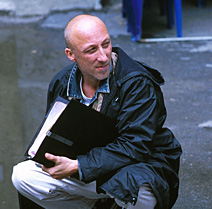 Oliver Hirschbiegel (Director - 'Downfall')
Oliver Hirschbiegel (Director - 'Downfall')
'The Upside of Down'
Having come to international attention in 2001 with the chilling exploration of power, 'Das Experiment,' German director Oliver Hirschbiegel now turns his eye on the last 12 days of Hitler. 'Der Untergang' ('Downfall') has been a big hit in Germany. But Bruno Ganz's human portrayal of the Nazi dictator - who is seen being nice to his secretaries and his beloved Alsatian, Blondi - sparked a controversy which is still rumbling on.
How much did you hear about Hitler and the Third Reich growing up? "It was talked about but the people themselves were not dealt with. It was just lining up facts and, of course, stating that this must never happen again and we're guilty. But that's a dead-end road because we're talking about our roots. Germany had been a civilised nation for hundreds and hundreds of years, and had produced the most wonderful music, thinkers, poets, philosophers, great inventors. Then, all of a sudden, this happens. I think it's an obligation for any civilised nation to examine a phenomenon like that.'
What did you want to know? "I had very simple questions like: why would people do that? Didn't anybody notice that the whole thinking elite was taken out? They were taken to the camps, they were molested, they were beaten up, and they had to flee the country. All their goods stayed and other Germans went out and said, "I always wanted a piano. The Rosenbaums have a nice one - let's go up and get that piano." So what kind of consciousness was working there? What did people think? All these things had never really been dealt with."
Did you have reservations about taking on this project, as a German especially? "I thought I'd never do a historical picture because most of the ones I've seen were unwittingly comic or not believable. And especially when it came to the Third Reich, I was, like, no way. But then I read [the producer/screenwriter] Bernd Eichinger's first draft and I slowly realised that there was a necessity to do this. The main thing that held me back was knowing that I would have to spend at least two years of my life in this terrible place. There's nothing intelligent, original, or entertaining within this National Socialist chapter. It's just horrible on all levels. My wife told me not to do it but after three or four months, I just came to the conclusion that I had to do it."
The way you have humanised Hitler in the film has sparked controversy in Germany. Do you understand the reaction? "I don't know what they're talking about really. We all know he wasn't a crocodile, he wasn't an elephant: he was a human. That's the true monstrosity. All these people were human beings and they knew exactly what they were doing."
Hitler is often referred to as an actor. Is that how you and Bruno Ganz approached him? "Yeah, we agreed on that. Hitler was a brilliant actor and he would use anything that you have at hand as a human being to get to the masses. That includes self pity as well as his enormous will power. He had this great ability to be auto-suggestive; he could talk himself into some strange idea and then get people to believe it too. Also, there was an extreme will for destruction in this man. All the orders he gave out were basically pointed towards destruction, murder, violence, all that. It's scary."
How did you feel the first time you saw Bruno as Hitler? "The most impressive moment was in the casting studio. He was already Adolf Hitler. I taped him to find out if this would work and I could see how shocked he was when I showed the footage to him. Later when we would meet, and especially when we shot, it was more like two historians talking to each other than an actor and a director. It was odd because you were talking to Adolf Hitler about Adolf Hitler. He was so under the skin, so much Adolf Hitler, it was spooky.'
The German newspaper Die Welt said the film heralded a "sign of emancipation" by showing Germany's ability to come to terms with its past. What do you say to that? "Coming to terms with the past? To me it sounds a bit like finding peace. But there can be no such thing. This is the worst crime that ever happened in the history of our world. There is no coming to terms. Of course the Germans now are not guilty - most of them were born after the war - but they were our people, our ancestors who did this. So we have the responsibility whether we want it or not. We have the responsibility."
Back To Archives

